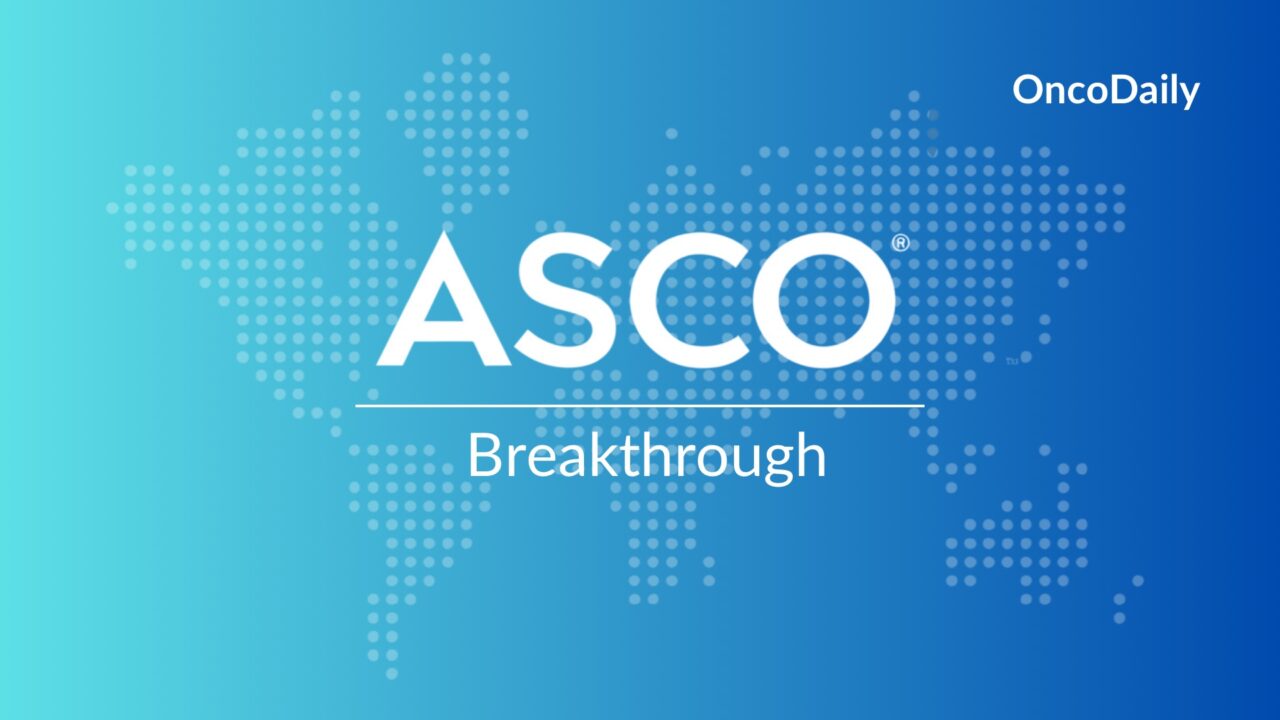With the integration of technology like artificial intelligence, early cancer detection rates have improved by over 20%, revolutionizing the approach to oncology. ASCO Breakthrough is a pivotal event that highlights such transformative advancements, bringing together groundbreaking research and next-generation cancer treatments. This article will explore the structure of ASCO Breakthrough, focusing on sessions dedicated to digital diagnostics, personalized medicine, and innovations in immunotherapy. We’ll also cover key networking opportunities and highlight the event’s role in shaping the future of oncology.
What is ASCO Breakthrough?
ASCO Breakthrough was established as a forward-looking event to serve as a hub for advanced cancer research and technological innovation. Designed to push the boundaries of traditional oncology conferences, it brings together experts from diverse fields to explore the latest technologies and research that are transforming cancer care. With an interdisciplinary focus, ASCO Breakthrough unites professionals in clinical oncology, technology, data science, and bioinformatics, all converging on new frontiers in cancer treatment and diagnosis.
The event covers pioneering topics like genomics and bioinformatics, which play crucial roles in personalized medicine. By leveraging patient-specific genetic data, these fields are paving the way for more targeted and effective therapies. ASCO Breakthrough’s emphasis on innovations like these showcases its impact on the future of cancer care, where treatments can be increasingly individualized and technology-driven, ultimately enhancing patient outcomes and advancing oncology standards worldwide.
The Evolution of ASCO Breakthrough
Since its inception in 2019, ASCO Breakthrough has rapidly evolved into a premier platform for showcasing cutting-edge advancements in oncology. The inaugural meeting in Bangkok, Thailand, set the stage for a global exchange of innovative ideas and technologies aimed at transforming cancer care.
Over the years, ASCO Breakthrough has consistently highlighted transformative technologies such as Chimeric Antigen Receptor T-cell (CAR-T) therapy and artificial intelligence (AI)-driven diagnostics. CAR-T therapy, which involves modifying a patient’s T-cells to target cancer cells, has shown remarkable efficacy in treating certain hematologic malignancies.
Similarly, AI-driven diagnostics have enhanced early cancer detection and personalized treatment planning, leading to improved patient outcomes.
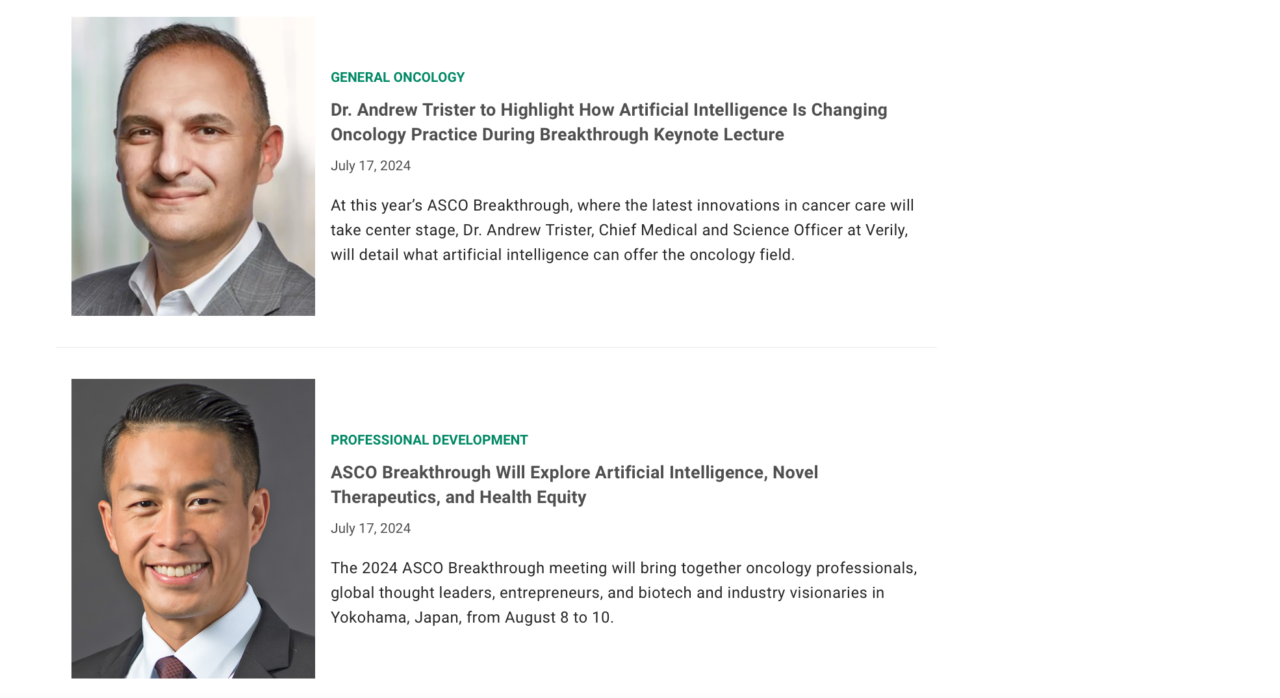
Demonstrating adaptability, ASCO Breakthrough has embraced virtual formats and hybrid models to ensure the dissemination of the latest oncology research and technological advancements. This flexibility has allowed the symposium to continue its mission of fostering innovation and collaboration among oncology professionals worldwide, even amidst global challenges.
By continually integrating emerging technologies and research findings, ASCO Breakthrough remains at the forefront of oncology innovation, significantly influencing clinical practices and improving patient care globally.
ASCO Breakthrough Mission and Vision
ASCO Breakthrough’s mission centers on driving scientific innovation and improving cancer care through next-generation oncology research. With a focus on transforming the landscape of cancer treatment, ASCO Breakthrough aims to bring together experts from diverse fields—oncology, technology, bioinformatics, and clinical research—to foster interdisciplinary collaboration that accelerates the development of advanced treatments.
ASCO envisions a future where the integration of cutting-edge technologies and collaborative research becomes standard in cancer care. To achieve this, ASCO Breakthrough promotes initiatives that bridge gaps across disciplines, encouraging cross-field partnerships that can lead to novel approaches in areas like personalized medicine, digital diagnostics, and cellular therapies. In addition to advancing treatment modalities, the event emphasizes addressing global disparities in cancer care, ensuring that innovative therapies reach underserved communities.
Through this commitment to both innovation and equity, ASCO Breakthrough is setting a global standard for advanced cancer treatments that prioritize both clinical excellence and accessibility, shaping the future of oncology on a broad and inclusive scale.
Why is ASCO Breakthrough Important for Oncology?
ASCO Breakthrough is a crucial event for oncology professionals, as it showcases transformative innovations that shape the future of cancer care. For oncologists, researchers, and healthcare providers, this event offers a unique opportunity to learn about the latest advancements that could soon redefine clinical practices. By highlighting pioneering therapies and technologies, ASCO Breakthrough directly influences how oncology professionals approach patient care, integrate new treatments, and conduct research.
One such example is the progress in immunotherapies discussed at past conferences. ASCO Breakthrough has highlighted groundbreaking work on immune checkpoint inhibitors and CAR-T cell therapies, both of which have transformed the treatment landscape for certain cancers, particularly hematologic malignancies. The success of these therapies has spurred further research into immune-based treatments for solid tumors, demonstrating the potential to broaden the application of immunotherapies across cancer types.

Latest Posts from ASCO Breakthrough 2024: Edition by OncoDaily
Precision diagnostics is another area where ASCO Breakthrough has had a significant impact. Past conferences have explored advanced genomic profiling tools and AI-guided diagnostics that enable physicians to tailor treatment plans based on patients’ unique genetic makeup. These innovations allow for earlier detection, more targeted interventions, and, ultimately, better outcomes. As more data from precision diagnostics is incorporated into clinical research, oncology professionals are better equipped to develop treatments that are both highly effective and personalized.
For oncology professionals, attending ASCO Breakthrough means staying at the forefront of evolving treatment standards, gaining insights that translate into more precise and effective patient care. The innovations presented serve as both a preview of future clinical guidelines and an inspiration for ongoing research, ensuring that the event remains essential for advancing the field of oncology.
How ASCO Breakthrough Advances Oncology Research
ASCO Breakthrough plays a vital role in advancing oncology research, acting as a platform where emerging technologies and experimental practices are introduced and discussed. With a strong focus on next-generation oncology tools, the conference has consistently highlighted groundbreaking research topics, such as AI-guided diagnostics, precision oncology, and theranostics.
- AI-guided diagnostic tools, a frequent feature at ASCO Breakthrough, have shown significant potential in improving early cancer detection and risk assessment. For example, presentations have demonstrated how machine learning algorithms are trained to identify cancerous patterns in imaging data, enhancing diagnostic accuracy. This technology has already begun to influence experimental clinical practices, where oncologists are increasingly incorporating AI tools to support diagnostic decisions.
- Precision oncology is another major area of focus at ASCO Breakthrough. The conference regularly showcases studies on targeted therapies tailored to patients’ specific genetic and molecular profiles. These presentations, such as the use of genomics to customize treatments in lung and breast cancers, have influenced a shift in clinical practice toward more personalized care, allowing for treatments with higher efficacy and fewer side effects.
- Theranostics, a newer field that combines therapeutic and diagnostic techniques, is also a key topic. Research presented at ASCO Breakthrough has explored how theranostic agents, like radiolabeled compounds, can target specific cancer cells for imaging and treatment simultaneously. These approaches have shown promise in clinical trials and are increasingly being tested in experimental practice for their dual impact on detection and treatment.
By spotlighting these advancements, ASCO Breakthrough promotes the integration of innovative research into experimental practices, guiding oncology towards more effective, personalized, and precise cancer care.
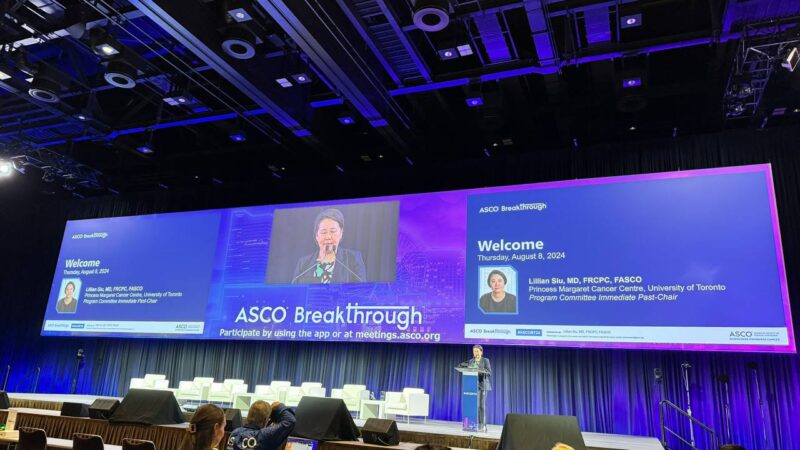
Key Highlights from ASCO Breakthrough 2024
- CRISPR Applications: Sessions explored CRISPR’s role in gene editing for cancer treatment, highlighting its potential to correct genetic mutations and enhance immunotherapy efficacy.
- Novel Biomarkers: Researchers presented new biomarkers for early cancer detection and treatment response monitoring, aiming to personalize therapy and improve patient outcomes.
- Targeted Therapies: Advancements in antibody-drug conjugates (ADCs) were discussed, focusing on their ability to deliver cytotoxic agents directly to cancer cells, thereby minimizing damage to healthy tissues.
- Dr. Pamela Kunz: Addressed the importance of inclusive science in oncology, advocating for diverse research approaches to enhance treatment efficacy across populations.
- Dr. David Wang: Discussed recent advancements in gastrointestinal cancer treatments, emphasizing the integration of novel therapies into clinical practice.
- Artificial Intelligence in Oncology: Sessions covered AI’s role in diagnostics and treatment planning, showcasing its potential to revolutionize patient care.
- Immunotherapy Developments: Presentations highlighted new immune checkpoint inhibitors and CAR-T cell therapies, demonstrating improved outcomes in various cancer types.
- Innovative Posters: Researchers presented studies on AI-enhanced electrochemical methods for rapid methylation detection in circulating free DNA, advancing multi-cancer early diagnosis.
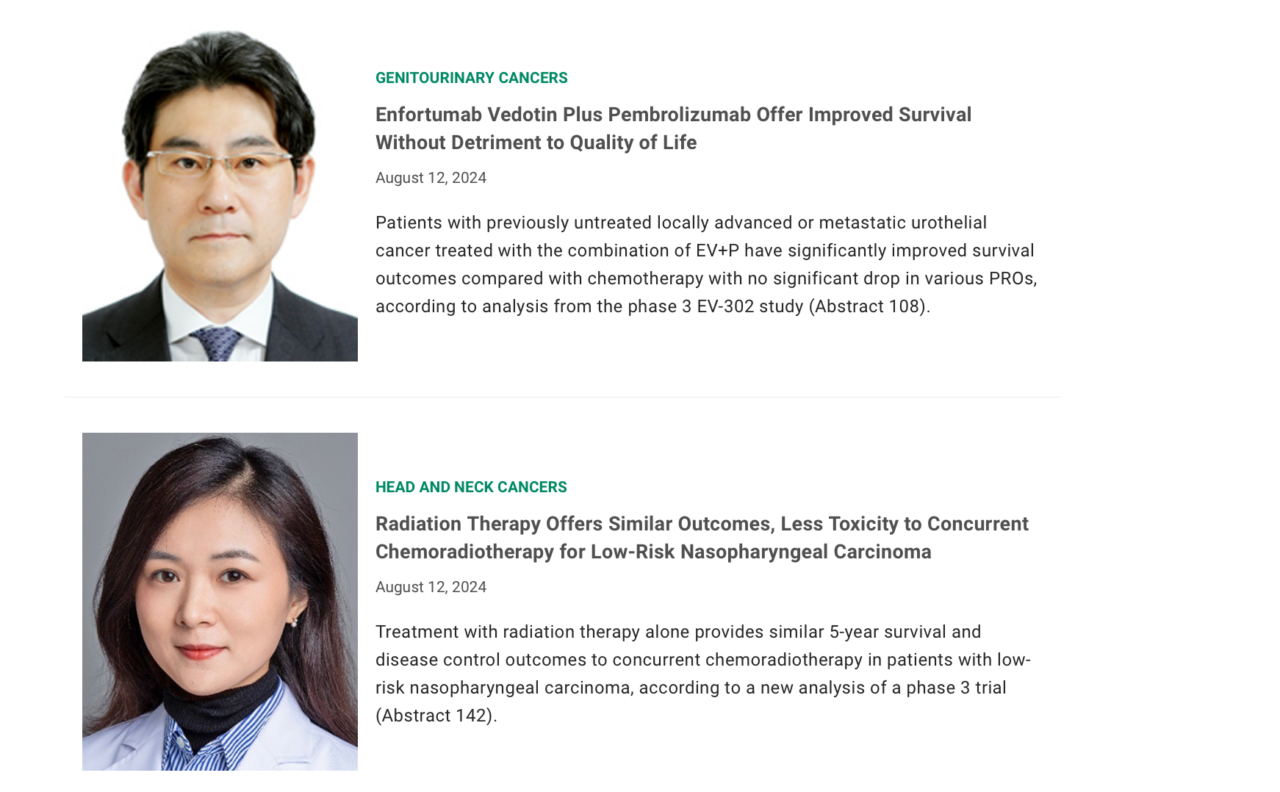
Emerging Technologies at ASCO Breakthrough
Advancements in artificial intelligence (AI) and machine learning (ML) are significantly transforming early cancer detection and personalized treatment planning. These technologies, alongside innovations in bioinformatics and big data analytics, are enhancing diagnostic accuracy and tailoring therapies to individual patient profiles.
AI and ML in Early Cancer Detection:AI-driven models are improving the accuracy and speed of cancer diagnosis. For instance, a UCLA study demonstrated that an AI tool, Unfold AI, detected prostate cancer with 84% accuracy, surpassing the 67% accuracy of human doctors. This tool utilizes clinical data to create 3D cancer estimation maps, aiding in targeted treatments and reducing the need for full-gland removal, which often leads to side effects like incontinence and impotence.
Personalized Treatment Planning through Bioinformatics and Big Data:The integration of bioinformatics and big data analytics is pivotal in developing personalized cancer treatments. Caris Life Sciences employs whole-exome DNA sequencing (WES) and whole-transcriptome RNA sequencing (WTS) to understand disease biology and optimize patient-centered cancer-treatment decisions. This approach enables the identification of specific genetic mutations and molecular profiles, allowing for tailored therapies that improve patient outcomes.
Case Study: AI in Lung Cancer Diagnosis and Prognosis A systematic review and meta-analysis explored AI-driven models for diagnosing and predicting outcomes in lung cancer. The study found that these models could accurately assess disease progression and patient prognosis, facilitating more informed treatment decisions. By analyzing large datasets, AI algorithms identified patterns and biomarkers that might be overlooked by traditional methods, underscoring the potential of AI in enhancing lung cancer care.
These examples illustrate the transformative impact of AI, ML, bioinformatics, and big data on cancer care, leading to earlier detection, more accurate diagnoses, and personalized treatment strategies that improve patient outcomes.
Innovations in Targeted Therapy
Advancements in targeted therapies, particularly bispecific antibodies and CAR-T cell treatments, are showing promise for rare cancer types, offering improved patient outcomes and reduced side effects.
- Bispecific Antibodies: Bispecific antibodies are engineered to bind simultaneously to two different antigens, enhancing the immune system’s ability to target cancer cells. For instance, glofitamab, a CD20xCD3 bispecific antibody, has demonstrated significant activity in patients with relapsed or refractory diffuse large B-cell lymphoma (DLBCL). Clinical trials have reported high response rates with manageable toxicity profiles, indicating its potential as an effective treatment option.
- CAR-T Cell Therapies: Chimeric Antigen Receptor T-cell (CAR-T) therapies involve modifying a patient’s T-cells to recognize and attack cancer cells. Recent studies have shown that CAR-T therapies targeting specific antigens, such as CD19, have led to durable remissions in patients with certain hematologic malignancies. Notably, these therapies have been associated with improved progression-free survival rates compared to traditional treatments.
- Antibody-Drug Conjugates (ADCs): ADCs combine the specificity of antibodies with the cytotoxic potency of chemotherapy drugs, delivering targeted treatment to cancer cells while minimizing damage to healthy tissues. Recent developments in ADCs have focused on enhancing their efficacy and safety profiles. For example, novel ADCs targeting HER2-positive cancers have shown promising results in clinical trials, offering new hope for patients with limited treatment options.
- Promising Clinical Trials: Ongoing clinical trials are exploring the efficacy of these targeted therapies across various rare cancer types. For instance, studies investigating the use of bispecific antibodies in multiple myeloma and CAR-T therapies in mantle cell lymphoma are underway, with preliminary results indicating favorable outcomes. These trials are crucial for expanding the applicability of targeted therapies to a broader range of malignancies.
ASCO Breakthrough 2025: What to Expect
ASCO Breakthrough 2025 is expected to spotlight transformative themes in oncology, including advancements in liquid biopsies, theranostics, and personalized therapies. Anticipated key sessions will focus on cell-based therapies, such as CAR-T innovations, and the latest in cancer vaccine research. Attendees can look forward to updates on prominent clinical trials exploring these treatments’ efficacy across various cancer types.
Renowned experts are set to deliver keynote addresses, sharing insights on integrating these cutting-edge technologies into clinical practice. The event’s emphasis on precision diagnostics and emerging therapeutics underscores its role in shaping the future of individualized cancer care.
Key Topics at ASCO Breakthrough 2025
ASCO Breakthrough 2025 is anticipated to cover a range of impactful topics shaping the future of oncology:
- Advanced Diagnostics: Focused on innovations like liquid biopsies and molecular imaging, enabling earlier and more accurate cancer detection.
- Immunotherapy: Updates on novel immune checkpoint inhibitors and cell-based therapies, such as CAR-T cells, expanding treatment options across cancer types.
- Cancer Genomics: Highlighting breakthroughs in genetic profiling to inform personalized treatments based on individual tumor mutations.
- Targeted Therapies: Emphasis on bispecific antibodies and antibody-drug conjugates for precise targeting of cancer cells, improving efficacy and reducing side effects.
- Imaging Techniques: Advancements in theranostics and AI-enhanced imaging to support real-time diagnostics and treatment monitoring.
- Data-Driven Approaches: Leveraging big data and bioinformatics to guide personalized care and predict patient outcomes, making treatments more adaptive and effective.
Networking and Career Development Opportunities
ASCO Breakthrough 2025 will offer valuable networking opportunities designed to foster connections and collaboration across the oncology field. Panels and networking luncheons for early-career professionals will allow emerging oncologists to connect with peers and mentors, offering guidance on career development, research opportunities, and clinical insights. Dedicated sessions for women in oncology will provide a supportive space for discussing career challenges, leadership opportunities, and advancing gender equity in the field.
Additionally, cross-field collaboration sessions will encourage participants from diverse specialties—such as bioinformatics, molecular biology, and clinical oncology—to share insights and explore interdisciplinary projects. These networking events allow attendees to learn directly from leading oncologists and researchers, enriching their professional networks and gaining firsthand insights into the latest trends and practices in oncology.
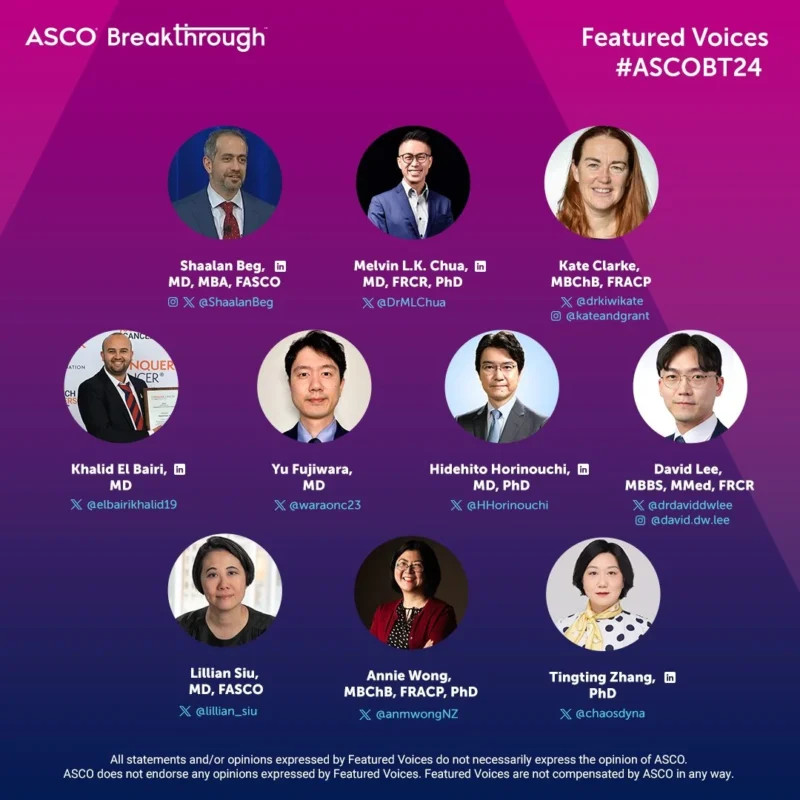
Social Media Abassadors of ASCO Breakthough 2024
How to Register for ASCO Breakthrough 2025
- Early-Bird Discounts: Register by the early-bird deadline to receive discounted rates. Early registration not only saves on costs but also gives you priority access to limited-capacity sessions, allowing you to secure spots in popular workshops and panels.
- Membership Benefits: ASCO members enjoy reduced registration fees for both in-person and virtual attendance. Membership also provides access to exclusive resources, including session recordings and additional educational content.
- Virtual Attendance Options: For those unable to attend in person, ASCO Breakthrough offers a virtual option with access to live-streamed sessions, on-demand recordings, and select networking opportunities.
- Benefits of Early Registration: In addition to discounts, early registrants have a better chance of booking limited-capacity sessions and are more likely to receive timely updates about event highlights and opportunities.

Innovations in Immunotherapy at ASCO Breakthrough
Recent advancements in immunotherapy have significantly impacted the treatment of various cancers, particularly through combination therapies that enhance efficacy and broaden applicability.
- Melanoma:Combining immune checkpoint inhibitors has shown remarkable success in treating advanced melanoma. The combination of nivolumab (anti-PD-1) and ipilimumab (anti-CTLA-4) has demonstrated improved overall survival rates compared to monotherapy. Clinical trials have reported a 5-year overall survival rate of 52% for patients receiving this combination, highlighting its effectiveness.
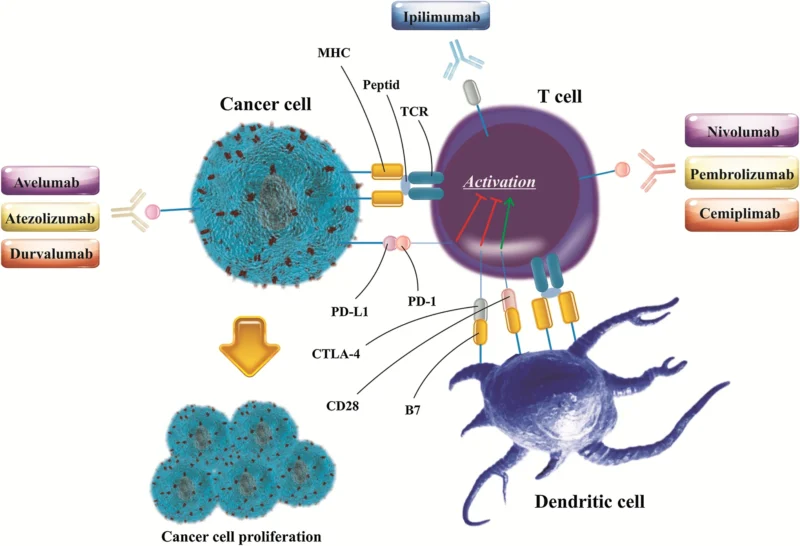
- Colorectal Cancer:In colorectal cancer, particularly for patients with microsatellite instability-high (MSI-H) tumors, immunotherapy combinations are proving beneficial. The combination of pembrolizumab (anti-PD-1) with chemotherapy has shown promising results, leading to higher response rates and prolonged progression-free survival. Ongoing trials continue to explore these combinations to optimize treatment strategies.
- Lung Cancer:For non-small cell lung cancer (NSCLC), combining immunotherapy with chemotherapy has become a standard approach. The addition of pembrolizumab to platinum-based chemotherapy has resulted in significantly improved overall survival and progression-free survival in patients with metastatic NSCLC. This combination has been approved for first-line treatment, reflecting its efficacy.
These advancements underscore the potential of combination immunotherapies to enhance treatment outcomes across various cancer types, offering new hope for patients through more effective and personalized therapeutic approaches.
ASCO Breakthrough and Global Impact on Cancer Research
ASCO Breakthrough plays a pivotal role in promoting the adoption of innovative technologies that reshape oncology practices and research. By serving as a platform for the latest advancements in cancer care, ASCO Breakthrough fosters collaboration across diverse fields—such as genomics, AI, and bioinformatics—that are instrumental in driving precision oncology.
One major example is the introduction and expansion of precision oncology tools, like genetic and molecular profiling platforms, which allow oncologists to tailor treatments to individual patient profiles. By highlighting advancements in these tools, ASCO Breakthrough has influenced research directions toward more personalized and effective therapies. For instance, sessions on AI-driven diagnostics and biomarker identification have encouraged broader adoption of these technologies, making them integral to early cancer detection and treatment response assessment.
ASCO Breakthrough’s emphasis on interdisciplinary collaboration also plays a crucial role in advancing cancer care. By bringing together professionals from oncology, technology, and data science, ASCO fosters an environment where innovative ideas can be shared and developed into practical applications. This approach has accelerated the integration of advanced diagnostics and data analytics into clinical settings, improving patient outcomes and shaping the future of cancer treatment. Through its commitment to innovation and collaboration, ASCO Breakthrough continues to set standards and propel the field of oncology forward.
Notable Research from Past ASCO Breakthrough Meetings
Past ASCO Breakthrough events have showcased impactful research that is shaping the landscape of experimental oncology and emerging treatments. Key advancements include the use of AI in diagnostics, where machine learning algorithms have been applied to enhance early cancer detection and streamline diagnostic processes.
- For example, AI models presented have demonstrated improved accuracy in identifying tumor markers, which supports more precise and timely interventions.
- Liquid biopsies have also been a focal point, with research underscoring their potential for non-invasive cancer monitoring. Studies have shown that liquid biopsies can detect circulating tumor DNA, allowing for real-time assessment of treatment efficacy and early relapse detection, especially in hard-to-reach cancers.
- Precision medicine applications continue to advance as well, with breakthroughs in genetic profiling and molecular analysis facilitating treatments tailored to individual tumor profiles.
These precision approaches, including targeted therapies and personalized immunotherapy, are redefining patient-specific care and have led to significant improvements in outcomes across several cancer types. Collectively, these innovations are driving forward both research and clinical practices, establishing ASCO Breakthrough as a leader in promoting the latest in cancer technology and treatment.
How to Stay Updated on ASCO Breakthrough News and Events
- Subscribe to ASCO Newsletters: Receive the latest information on meetings, research, and oncology news directly in your inbox. You can subscribe to ASCO’s mailing list for updates.
- Follow ASCO on Social Media: ASCO maintains active profiles on platforms like Twitter, Facebook, and LinkedIn, sharing real-time updates and important announcements. Engaging with these channels ensures you won’t miss critical information.
- Join Oncology Forums: Participate in professional networks such as ASCO Connection, where you can engage with peers, discuss developments, and receive updates on upcoming events.
FAQ
What is ASCO Breakthrough?
ASCO Breakthrough is an annual event organized by the American Society of Clinical Oncology, highlighting cutting-edge cancer research and emerging treatment technologies.
Why is ASCO Breakthrough important for oncology professionals?
This event provides the latest updates on transformative technologies in oncology, allowing professionals to stay ahead in treatment trends and technological advancements that shape patient care.
What types of topics are covered at ASCO Breakthrough?
Key topics include advancements in AI, precision medicine, liquid biopsies, and theranostics, focusing on innovations that improve cancer detection and treatment.
How does ASCO Breakthrough differ from the ASCO Annual Meeting?
While the ASCO Annual Meeting covers a wide range of oncology topics, ASCO Breakthrough focuses specifically on innovative, technology-driven approaches and experimental cancer treatments.
Who should attend ASCO Breakthrough?
The event is ideal for oncology researchers, clinicians, technologists, and healthcare professionals interested in the latest cancer care technologies and research collaborations.
Can I attend ASCO Breakthrough virtually?
Yes, ASCO typically offers virtual attendance options, allowing remote access to live sessions, networking opportunities, and on-demand content.
How can ASCO Breakthrough impact clinical practice?
By showcasing successful clinical trials and technological innovations, ASCO Breakthrough provides insights that can lead to more personalized, efficient, and effective cancer treatments in clinical settings.
What are some examples of impactful research presented at ASCO Breakthrough?
Past events have highlighted AI-based diagnostic tools, personalized immunotherapies, and the use of liquid biopsies, each of which has contributed to advancements in experimental and clinical oncology.
Are there networking opportunities at ASCO Breakthrough?
Yes, the event offers various networking sessions, including panels for early-career professionals, women in oncology, and cross-field collaborations.
How can I stay informed about updates for ASCO Breakthrough?
Subscribe to ASCO newsletters, follow ASCO on social media, and join oncology forums to stay updated on event registration, deadlines, and program highlights.


